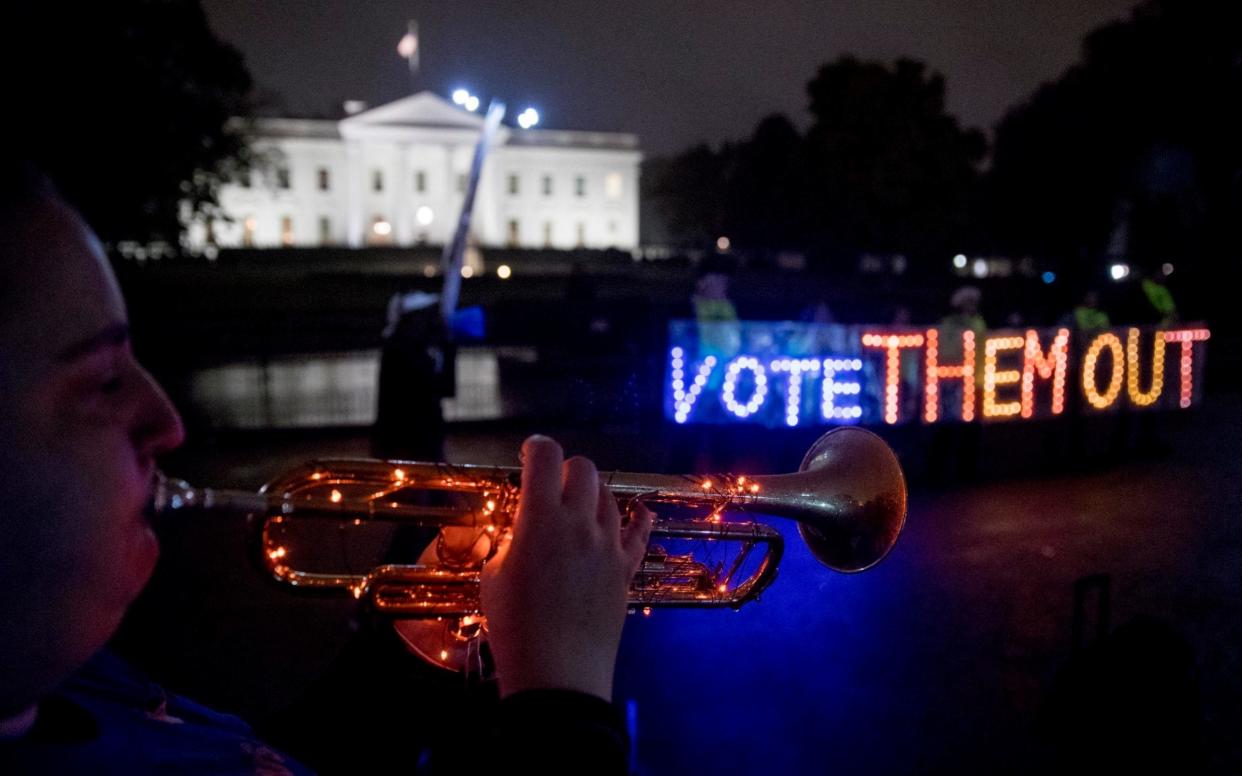House of Representatives: Role, responsibilities - and what a change of control at the midterms means

The House of Representatives is the lower chamber of the US Congress and is made up of 435 seats.
The number of seats each US state receives depends on its population size. California, the most populous state, has 53 representatives while seven states - Alaska, Delaware, Montana, North Dakota, South Dakota, Vermont and Wyoming have just one representative.
The Republican Party went into Tuesday's midterm elections in control of the chamber with a 43-seat majority. However, Democrats rode a wave of dissatisfaction with President Donald Trump to gain the 23 seats needed to win control of the House.
How things could change
Historically, the president's party routinely loses House seats in midterm elections. Indeed the University of Virginia's Centre for Politics points out that the president's party has lost seats in all but three of the 29 midterms held since 1900.
The US economy is booming, with low unemployment rates and rising wages. However some Republicans have been unnerved by Mr Trump's spending.
While Mr Trump's tax cuts for corporations was popular among business owners, the country's deficit has increased by 33 per cent in the past year to $895 billion.

Mr Trump's approval rating is around the 40 per cent mark - a figure which did not help Republicans standing for re-election. Moreover, a liberal base hoping to derail Mr Trump's agenda has energised Democratic activists in key races, out-fundraising and out-polling a host of Republican incumbents.
What will it mean for Donald Trump?
Now the Democrats have won the House, they get to decide which bills come to the floor - meaning President Donald Trump's domestic agenda will struggle to make its way into law.
The party with a majority in the chamber also controls its committee chairmanships and has the power to issue subpoenas - so a Democrat-controlled House could enforce aggressive oversight of investigations of the president's administration, including alleged Russian collusion, Mr Trump's business dealings and sexual assault allegations against him.
Pundits predict Democrats will launch controversial investigations into things like Mr Trump's tax returns and his previous business dealings. They may also seek public hearings with members of the Trump family, including his son Donald Jr who appears to be a key figure in the Russia investigation.
They also could force Trump to scale back his legislative ambitions, possibly dooming his promises to fund a border wall with Mexico, pass a second major tax-cut package or carry out his hardline policies on trade.
A simple House majority would be enough to impeach Trump if evidence surfaces that he obstructed justice or that his 2016 campaign colluded with Russia. But Congress could not remove him from office without a conviction by a two-thirds majority in the Republican-controlled Senate.
House Democrats could be banking on launching an investigation using the results of US Special Counsel Robert Mueller's already 18-month-old probe of allegations of Russian interference on Trump's behalf in the 2016 presidential election. Moscow denies meddling and Trump denies any collusion.

Democrats on the House oversight committee, the chamber’s main investigative panel, have already suggested they are prepared to issue subpoenas if they gain control.
Representative Elijah Cummings, the ranking Democrat on the oversight committee, said: “If Democrats win the majority in November, we would finally do what Republicans have refused to do, and that is conduct independent, fact-based, and credible investigations of the Trump administration".
Mr Cummings said their investigations would "address issues like the security clearance process, conflicts of interest, the numerous attempts by Republicans to strip away healthcare from millions of Americans, postal service reforms, prescription drug pricing, and voting rights”.
Republicans have, however, held on to the Senate, meaning they will continue to approve Mr Trump's cabinet nominees and appoint conservative judges to US courtrooms.
Seats to watch
West Virginia
Donald Trump won West Virginia's 3rd district by 30 points. But it is the Democratic candidate running in the district, which has a long history of coal mining, that is gaining national attention. Richard Ojeda says he voted for Mr Trump in 2016, opposes universal background checks for gun buyers, and is pro-coal.
Mr Ojeda was running against Republican Carol Miller in the open-seat race after the incumbent Republican Evan Jenkins vacated the seat to run for the Senate.
Polling suggested it would be a tight race between the two candidates, and analysts were keeping a close watch to see if a populist Democrat in a pro-Trump area is a winning formula.
It wasn't. Ms Miller was projected to defeat Mr Ojeda.
California
Republican Representative Mimi Walters was battling to keep hold of her seat against Democrat Katie Porter in the state's 45th district, Orange County. The number of registered Republicans in the county has consistently declined as its population becomes more diverse.
Ms Walters was one of seven Republicans representing districts in California which Hillary Clinton won in 2016. The Democrats needed to take several of these in order to regain a majority in the House.
Pundits were viewing a win in this race as a sign they will do well across Southern California - picking up crucial Republican-held seats.
But with almost half the votes counted, Ms Walters was in the lead.
Minnesota
Minnesota's 8th district was considered one of the Democrats' most at-risk seats in November. It is a traditionally Democrat area - former president Barack Obama won the district twice but it swung heavily to Donald Trump in the 2016 election.
The seat was held by Democrat Rick Nolan but the 74-year-old was not seeking re-election.
The party's candidate Joe Radinovich, a former state legislator, was facing a tough battle against Republican Pete Stauber, a county commissioner, and the Republican ended up defeating his opponent.
Texas
The race in Texas' 23rd district largely focused on one of the Trump administration's main concerns - immigration. The district contains a third of the US-Mexico border and has the second highest population of 'Dreamers' - the term given to undocumented migrants who arrived in America as children and have been granted temporary protection.
The incumbent, Republican Will Hurd, was a former CIA agent who has chosen to distance himself from Mr Trump. His Democratic rival, Gina Ortiz Jones, was a Filipina-American, openly LGBTQ and an Iraq veteran.
Mr Hurd, who became the first African-American elected to Congress from Texas when he was elected in 2015, was tipped to win by a narrow margin in the swing district and, with more than 85% counted, he was projected to fend off his Democratic rival.
He had distanced himself from the national Republican party and even wrote an op-ed for the New York Times in July stating that the president had been manipulated by Russian intelligence.
Florida
Moderate Republicans were looking to Florida's 26th district to see whether they could keep hold of a largely Hispanic area in the Trump era.
The incumbent, Carlos Curbelo, was well-liked but Republicans feared his Democrat opponent, Latin immigrant Debbie Mucarsel-Powell, could sweep to a surprise victory.
Ms Mucarsel-Powell proved their fears well-founded, narrowly defeating her Republican rival.

